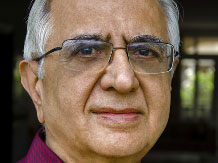(News) Revising civil service recruitment: K S Rana, former diplomat
Revising civil service recruitment: K S Rana, former diplomat
 In
1954, as a wide-eyed 17-year old university student (in those pre-Class XII
days), I trudged up and down New Delhi streets, camera in hand, looking for that
decisive moment, to capture the right image. The Holy Grail for a novice
photographer was acceptance by The Statesman for its then iconic Monday column,
'New Delhi Notebook', and my photo that made it (probably in 1956) was taken on
Shah Jahan Road, of a solitary tonga, ambling under a tree canopy, early on a
mist-draped winter morning. That road is home to Dholpur House, the seat of the
Union Public Service Commission (UPSC), the mecca for my ilk; many of us dreamt
of the Foreign or Administrative Service as the pinnacle of our ambition.
In
1954, as a wide-eyed 17-year old university student (in those pre-Class XII
days), I trudged up and down New Delhi streets, camera in hand, looking for that
decisive moment, to capture the right image. The Holy Grail for a novice
photographer was acceptance by The Statesman for its then iconic Monday column,
'New Delhi Notebook', and my photo that made it (probably in 1956) was taken on
Shah Jahan Road, of a solitary tonga, ambling under a tree canopy, early on a
mist-draped winter morning. That road is home to Dholpur House, the seat of the
Union Public Service Commission (UPSC), the mecca for my ilk; many of us dreamt
of the Foreign or Administrative Service as the pinnacle of our ambition.
The UPSC is unique among Indian institutions in its sustained, impeccable reputation for probity and fairness. It will thus be with special caution, I imagine, that the Expert Committee set up by the GoI in September 2015 will tackle its mandate to review all the processes and modalities of civil service recruitment. Its terms of reference are: 'to arrive at an examination pattern that is holistic and does not exhibit any bias for or against candidates from any particular stream, subject area, language or region.' This committee is to give its report in six months, and one hopes it will honour that deadline, notwithstanding the complexity of its task. It is to study the plan of examination, number of papers, their structure and duration, marking scheme, weightage of marks and system of evaluation, besides age limits and the wider factors mentioned above.
Offered here are some thoughts. First, consider the huge numbers that our civil service exams involve. Roughly 950,000 apply for the annual selection; of these, 460,000 take the 'preliminary' exam. That is ruthlessly pared down to a mere 15,000-odd that qualify for the 'main' exam. This second written test winnows the number to 4,000 that are called for interviews. We might call them the 'Grand Catchment' for the annual civil service intake. In the current system, they appear before the multiple interview boards that work in parallel, each chaired by a UPSC Member, assisted by a cluster of retired officials and others. Under time pressure, a mere half-hour is prescribed for each interview; in practice this leaves barely 25 minutes to engage each candidate, and assess her/his worth for public service. Is that sufficient for such a major selection?
Parliament has been concerned with the subjectivity of interviews, and over the years, the marks assigned to it have been pared down, to minimise this element. We also see a trend to do away with the interview altogether, for the junior branches of public services. But subjectivity can also be tackled another way, by making the interview process multi-layered, assessed separately by several professional panels, leaving no scope for manipulation.
Other public services around the world stretch their assessment of individuals to two or more days, conducted via complex programmes of individual and group interviews and discussions, tests and activities that gauge ability to respond to time and other pressures, people skills, service attitudes and empathy, plus psychological profile. Many will say there is simply no time to do this. That connects with my next point.
Courtesy: Business Standard

